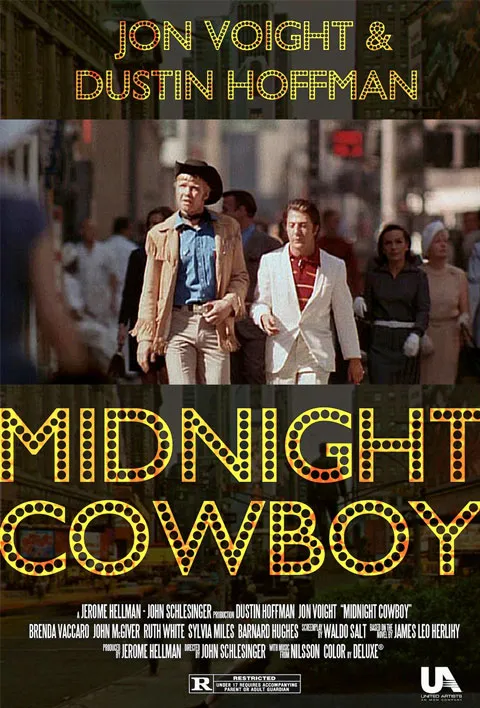
Midnight Cowboy is a 1969 American drama film directed by John Schlesinger, adapted by Waldo Salt from the 1965 novel of the same name by James Leo Herlihy.
The film stars Dustin Hoffman and Jon Voight, with supporting roles played by Sylvia Miles, John McGiver, Brenda Vaccaro, Bob Balaban, Jennifer Salt, and Barnard Hughes. Set in New York City, the film depicts the unlikely friendship between two hustlers: naïve sex worker Joe Buck (Voight), and ailing con man Rico Rizzo (Hoffman), referred to as "Ratso". The film won three Academy Awards, including Best Picture, Best Di)rector, and Best Adapted Screenplay.
Plot
"Midnight Cowboy is a 1969 film set in New York City, depicting the unlikely friendship between two hustlers: Joe Buck, a naive sex worker from Texas, and Rico "Ratso" Rizzo, an ailing con man. The two struggle with severe poverty, stealing food, and failing to find work.
The film also includes intermittent flashbacks of Joe's tragic relationship with Annie, as well as their encounter with a cowboy gang. The story revolves around the bond that develops between these two outcasts, transcending their broken dreams.
Trailer
@taskmaster4450le/re-leothreads-2fpedhqbe
Cast
- Jon Voight as Joe Buck
- Dustin Hoffman as Enrico "Ratso" Rizzo
- Sylvia Miles as Cass
- John McGiver as Mr. O'Daniel
- Brenda Vaccaro as Shirley
- Barnard Hughes as Towny
- Ruth White as Sally Buck
- Jennifer Salt as Annie
- Gil Rankin as Woodsy Niles
- Gary Owens as Little Joe
- T. Tom Marlow as Woodsy Niles Jr.
- George Eppersen as Ralph
- Al Scott as Ralph's Girl
- Linda Davis as Mother on the Bus
- Jane Howard as Old Lady on the Bus
- Helen Hanft as Cass' Secretary
- Richard Clarke as Man in Cowboy Hat
- Ronnie Shark as Ronnie
Director: John Schlesinger
Writer: James Leo Herlihy, Waldo Salt
Genre: Drama
Box Office (Gross USA): $44,801,177
Distributor: Criterion Pictures, Metro-Goldwyn-Mayer
Release Date (Theaters): May 25, 1969
Release Date (Streaming): Sep 16, 2008
Themes & reception
The film Midnight Cowboy is known for its exploration of themes such as urban alienation, poverty, and the unlikely friendship between the two main characters. The movie delves into the struggles of Joe Buck and Rico "Ratso" Rizzo as they navigate the harsh realities of New York City, portraying the city's downtrodden neighborhoods in the 1960s. Additionally, the film's treatment of homosexuality was considered remarkable for its time, as Voight's character engages in sexual acts with men to earn money, a shocking plot point at the time.
In terms of reception, Midnight Cowboy was well-received and is considered a breakthrough independent film. It won three Academy Awards, including Best Picture, Best Director, and Best Adapted Screenplay. The film's impact is also highlighted by its convergence along several different paths of movie history, making it a milestone in cinema. Despite its dark and problematic aspects, the film is recognized as a masterpiece that addresses important social and cultural themes.
Challenges Faced
During the production of Midnight Cowboy, the film faced several challenges and controversies. One significant challenge was the explicit gay content, which led to the film receiving an X rating due to its portrayal of homosexuality. This sparked a debate about the representation in mainstream cinema and the challenges faced by filmmakers who sought to authentically explore these themes.
Additionally, the film's budget constraints and the unconventional nature of the story presented production challenges. Midnight Cowboy was a low-budget movie that defied traditional studio norms, yet it achieved significant commercial success, contributing to the transformation of the studio system.
Furthermore, there were disputes over casting decisions, such as the initial choice of Michael Sarrazin for the role of Joe Buck. Ultimately, Jon Voight was cast, and the film's success vindicated this decision.
Visual Styles & techniques
Midnight Cowboy is known for its distinctive visual style and innovative techniques. The film's visual composition reflects a more experimental and diverging directorial style, which was groundbreaking for its time. The cinematography of Midnight Cowboy changed the look of American film and influenced visual elements in later music videos. The movie's visual style captures the gritty and downtrodden atmosphere of New York City in the 1960s, portraying whole neighborhoods that were essentially written off.
Fun Fact
One fun fact about the movie Midnight Cowboy is that its editing by Hugh A. Robertson creates a compelling narrative structure, contributing to the film's impact and success.
General:
Page by @iskafan
